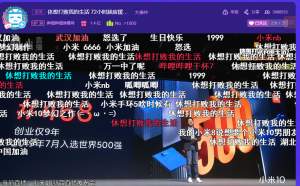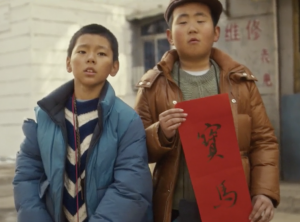
Used goods platform Idle Fish sponsors a talk show about celebrity possessions
News From China
Alibaba’s Idle Fish, a marketplace for used goods, has taken over the title sponsorship of the Youku-produced talk show “The Truth! Everything” ( 真相吧!花花万物) in its second season. It is a model for the development of brand integration in the realm of Chinese variety programming, spanning simple product placement via sponsorship, brands creating content, and cooperation with producers to customize a variety show that merges with the brand’s core concepts and values.
“The Truth!” reunites two popular hosts, Kevin Tai and Dee Hsu — who had a long-running program in Taiwan — interviewing celebrities about items found in their homes. The guests discuss the emotional bonds they have with objects, then ultimately put the items up for auction on Idle Fish, with the proceeds going to charity. Searching the show’s name on the Idle Fish app brings up celebrity items up for grabs, while viewers are also encouraged to put their own used goods up for sale on Idle Fish with the series promoting the concept of “getting rid of useless burdens” (断舍离).
Another example of platform and content integration comes from Alibaba rival Tencent. In the year since Tencent Video’s talent competition “Produce 101” (创造101) wrapped up, the 11-member group created by the show, Rocket Girls 101, nabbed more than 40 brand endorsement deals, played three major concerts, and appeared in six TV dramas, two variety shows, and one film. That wouldn’t have been possible without the resources available to Tencent Video to promote the group to businesses as well as consumers, and raises the question of how traditional production companies will be able to compete with powerful streaming video sites in the development of celebrities.
Costume dramas present a tricky dilemma for brand integration, as they take place in an era long before the contemporary brands that populate variety shows and dramas series set in the present day. One popular method of featuring brands in historical dramas is to create a mid-program commercial in the form of a “mini-drama” with actors from the show promoting modern-day products while in character. The recent finale of the critically-acclaimed “Longest Day in Chang’An” brought us such an ad for Niu electric scooters, with detective Xu Bin using data from Niu to avert a bomb threat in the ancient city.
In another creative twist, brands are placing their products directly in costume dramas by dressing their goods and services in an ancient style. A few current examples:
- “Queen Dugu” (独孤皇后), set in the Sui Dynasty (581-618), uses Gooben cosmetics, presented in silk boxes and lacquer jars, as a top-ranking reward.
- Characters in the fictional world of “Love and Destiny” (宸汐缘) are seen drinking Besheen liquor from ceramic bottles, and the brand is mentioned in dialogue.
- On the fantasy series “Novoland: Eagle Flag” (九州缥缈录), characters visit an antique-filled Bestore brand snack shop, with treats presented in silk-lined wooden lacquer boxes.
- E-commerce platform Vipshop, a very active brand sponsor, has also found its way onto “Novoland,” as well as “Good Bye, My Princess” (东宫) and “Princess Silver” (白发), by creating traditional-looking shops in the series under the fictional name “VIP Pavilion.”
Snack maker Three Squirrels is going ahead with production of its third animated series featuring cartoon squirrel characters, and substantially increasing its investment in the process. Three Squirrels signed an RMB 10 million agreement with its affiliate Squirrel Entertainment for 26 13-minute episodes under the tentative title “Three Squirrels’ Squirrel Village 2” (三只松鼠之松鼠小镇2) . Spending close to RMB 30,000 per minute is considered fairly high for animated content aimed at the young children’s market, though it shows the company’s commitment to developing a core of IP around the brand’s characters, which may also be licensed for video games, theme parks, and other products.
Trending tidbits from Media 360’s latest report on video:
- As China’s short video market matures, the leading apps Douyin (TikTok) and Kuaishou have shifted their strategic focus from acquiring users to competing for brand sponsors.
- On Weibo, more brands are using celebrities to star in vlogs, a format that has just recently started to gain traction in China.
- In television and video-streaming, the 2019 market for reality programming has been fairly conservative, but we’ll soon see more focus on competitive series centered on acting and basketball.
News in English
- Several Western luxury brands found themselves on the wrong side of Chinese geopolitics for implying that Hong Kong, Taiwan, and Macao are separate countries, prompting official apologies and the loss of celebrity brand ambassadors. Washington Post
- Esports are finding their way into traditional entertainment via film, streaming video series, and animation, with fictional star players now “endorsing” major brands as well. Meanwhile, a battle is brewing in real life for supremacy over game-streaming, with several contenders vying to become the Twitch of China. Radii, Bloomberg
- Variety’s cover story on China’s global entertainment ambitions is focused largely on the film industry, while acknowledging that the real innovation is taking place in the digital and mobile spaces thanks to its prolific app creators, online video platforms, and game developers. Variety
- Meanwhile, China’s video-streaming sites and their reality talent competitions are changing the music industry as well, as shows geared towards original song creation drive a trend towards “watching” music in place of “listening” to it. Radii
Partner News
- Beijing to Open Streaming Market to Foreign Firms That Obey Content Rules CFI
- Is China Future Fertile Ground for Celebrity “Disgrace Insurance”? Jing Daily
- Ask China Anything: A Peek Inside China’s ACG Culture CFI
- Versace Repeats the D&G Disaster: To Sell Global, Luxury Brands Need to Think More Local Jing Daily






